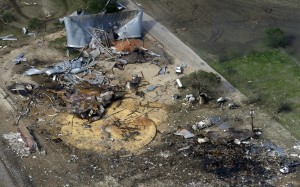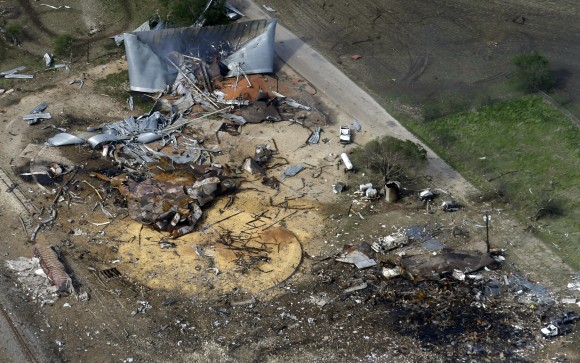When a Texas City refinery exploded in 2005, 15 people died. Months later, the U.S. Chemical Safety Board found that putting workers in temporary trailers near danger zones at the plant raised the death toll.
Since then, temporary trailers have been relocated industry wide.
The example is just one of dozens over the past decade involving the independent agency, which has been targeted for elimination in President Donald Trump’s preliminary budget. While the board, with a 2016 budget of $11 million, is viewed skeptically by some companies and their allies in Congress, it has also drawn its share of supporters.
“I don’t think anyone in the industry wants to see the Chemical Safety Board be abolished,” said Stephen Brown, a vice president with Tesoro Corp., an oil refiner that was the focus of a 2014 CSB report, in a telephone interview. “The goal is a fully functional, professional investigative body that approaches things in a professional manner with integrity.”
Funding for the agency is among the cuts outlined by Trump’s blueprint budget Thursday, a preliminary document that embodies the president’s spending priorities for the nation. The safety agency was created in 1990 to find the root causes of industrial accidents and recommend ways to keep them from happening again.
Not a Regulator
The CSB makes no rules and issues no penalties, but often identifies dangerous industry practices that are overlooked by enforcement agencies. Its scope of responsibility has included multi-fatality disasters from a 2013 fertilizer distributor in West, Texas, to BP Plc’s Deepwater Horizon drilling rig blowout in 2010.

(AP Photo/Tony Gutierrez)
CSB probes have led to many industry improvements that have saved lives without gaining public notice, said Michael Wright, director of health, safety and environment for the United Steelworkers of America. After a 2012 fire at a Chevron Corp. refinery in Richmond, California, the CSB discovered that the pipe used was subject to corrosion and rupture because of the materials it carried. Though there were no rules against using that kind of pipe, the industry changed its practice because of the CSB, Wright said in a phone interview.
“We know CSB recommendations have made our plants safer, not just (for workers but for residents surrounding those plants,” he said. “When a chemical accident is prevented, it doesn’t make news.”
Disappointed
CSB said in an emailed statement it’s disappointed in the president’s proposal. “Our investigations and recommendations have had an enormous effect on improving public safety,” said the statement from board Chairman Vanessa Allen Sutherland.
In 2014, a congressional probe criticized the agency, saying it was marred by an “abusive and hostile work environment” that had spurred several investigators to flee the agency. The report also said the agency was moving too slowly to complete its investigations. The chairman at the time has since resigned under pressure and new staff arrived.
CSB findings and training videos have reduced risks at natural gas sites, chemical plants, oil refineries and even in chemistry classrooms. Its investigation of the Texas City refinery explosion that killed 15 workers resulted in “landmark” changes to industry practices, said M. Sam Mannan, director of the Mary Kay O’Connor Process Safety Center at Texas A&M University. One example: refinery workers are no longer put at risk by working in temporary trailers placed within danger zones inside a plant site.
Those kind of benefits are delivered “for a measly $10 million dollars, in terms of the federal budget,” Mannan said in a phone interview.
Saving Lives
CSB’s primary charge is to prevent a major catastrophe at industrial facilities, the Steelworkers’ Wright said. For instance, oil refineries that use hydrogen fluoride, a highly corrosive acid, have the potential to spew a 20-mile toxic plume over cities such as Houston or Philadelphia, he said. After a 2015 explosion at an Exxon Mobil Corp. refinery in Torrance, California, the CSB found there had been a near miss of a ” potentially catastrophic” release of tens of thousands of pounds of dissolved hydrogen fluoride.
Michael Frohlich, spokesman for American Fuel & Petrochemical Manufacturers, declined to comment because the trade group is currently looking into how the potential change would affect its members.
Despite Trump’s proposal, the CSB probably won’t be eliminated because it acts as a safety net for industry as well as the public, said Katie Bays, an analyst at Height Securities LLC, an advisory and investment firm based in Washington. Without the CSB identifying problems, safety can sometimes slip through the cracks at industrial plants, Bays said, increasing the potential for accidents and companies’ liability.
“It’s a vitally important agency that has an outsize impact for a very small budget,” said Glenn Ruskin, communications director for the American Chemical Society, the world’s largest scientific society with about 160,000 members. “The safety board is an honest broker at identifying problems, and industry appreciates having that.”
–With assistance from Meenal Vamburkar and Barbara Powell
Topics Texas
Was this article valuable?
Here are more articles you may enjoy.



 Experian Launches Insurance Marketplace App on ChatGPT
Experian Launches Insurance Marketplace App on ChatGPT  AIG’s Zaffino: Outcomes From AI Use Went From ‘Aspirational’ to ‘Beyond Expectations’
AIG’s Zaffino: Outcomes From AI Use Went From ‘Aspirational’ to ‘Beyond Expectations’  Former Broker, Co-Defendant Sentenced to 20 Years in Fraudulent ACA Sign-Ups
Former Broker, Co-Defendant Sentenced to 20 Years in Fraudulent ACA Sign-Ups  Insurify Starts App With ChatGPT to Allow Consumers to Shop for Insurance
Insurify Starts App With ChatGPT to Allow Consumers to Shop for Insurance 

